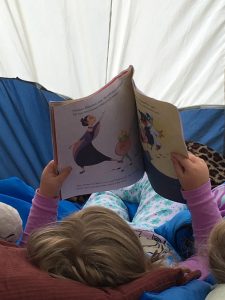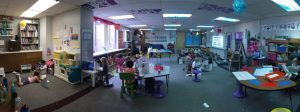Summer (Reading) Lovin’
 My daughter, Taylor, just started her first grade year. She left kindergarten at grade level in reading, and at the end of the year, she was just starting to believe in herself as a reader.
My daughter, Taylor, just started her first grade year. She left kindergarten at grade level in reading, and at the end of the year, she was just starting to believe in herself as a reader.
But throughout the summer, Taylor showed no gains in reading, even though she’s surrounded by two parents who are teachers and who value reading, and a sister who values reading and offers lots (and lots!) of encouragement. Taylor offered eye rolls when met with reminders of using strategies or reading the picture; I’m sure to see more in the teenage years too! She stuck with easy books and passed off other books to the rest of us.
This was hard for me. Teaching students to read is–as I point out to my children–what I do. They have both expressed that they have no interest in my wearing my teaching hat at home. They want me in the Mom role. So I have to be subtle.
Which got me thinking about those households that don’t have teachers in them, or parents who don’t have the drive to spend each evening reading. We as teachers can’t change what happens at home. We can encourage and remind till we are blue in the face, but it doesn’t always work. The summer slide seems to be inevitable, until every school becomes year round.
The first week of school solidified this thought for me. Students need the learning environment all the time, and not just September to June. In her first week, Taylor came home, picked up a Mo Willems book, and started reading it. I tried not to let my chin hit the floor, but couldn’t stop the excitement I felt. She was reading, without even being asked to. And it was a brand new title for her!
Just being back in an environment with an expectation of learning and the encouragement of her classroom teacher had flipped the switch for her.
Year-Round Reading
 Since this can-read attitude is a goal for my own kindergarteners, I’ve already started thinking about how to maximize this mindset for them when summer arrives. Yes, I know we’ve just started school, but the thought is fresh in my mind and the problem is a big one!
Since this can-read attitude is a goal for my own kindergarteners, I’ve already started thinking about how to maximize this mindset for them when summer arrives. Yes, I know we’ve just started school, but the thought is fresh in my mind and the problem is a big one!
Here are a few ideas:
- Have parents send videos of their child reading. The teacher could send a video clip back. This could be done through email, Instagram, a classroom Facebook page, a Google classroom hangout, or even Twitter, depending on parents’ comfort.
- Start a book club. Send out books, and have a focus (visualizing, predicting, retelling, connecting, etc.) for the students when they read. Parents could respond again through the options listed above. You could also provide a bag of books for the summer, along with a reading list. Remind 101 is a quick, text-message-based tool to send assignment reminders.
- Meet the previous class at the park or the school playground. Give them that reminder: You are a learner even over the summer!
- Invite future students to a meet and greet. Get the ball rolling early.
- Set up a book club at the local library, and have the kids meet you there. The library may even order extra copies of the books.
- Have the kids do video book reports. These can serve as recommendations to friends, and kids can post using the same channels listed above.
- Start a book chain mail with your class. Media mail is cheaper. You don’t have to use new books; kids can send out a favorite they would like to share.
- Meet at a book store. Work with a local book or comic book shop and see if they’ll let you meet there–or donate books to the cause.
- Trade used books. Have a used book trade a few times over the summer, and stay after to read them under the stars with flashlights.
I’m not sure which I am going to try or what will work best for my class this year. As I get to know my students and parents, I will try to figure out what would work best to keep that learning attitude over the summer.
Also, a lot of these ideas could be done during the school year too! Hopefully you’ll be able to try some of these ideas, or can share some of your own in the comments.
 Tricia Ziegler (Twitter: @axf96; blog: http://kindergartentreasures.blogspot.com/) is a kindergarten teacher at Loon Lake Elementary, in the Walled Lake School District. She is a part of the Walled Lake iCouncil (Instructional Council) team and is part of starting a coding club at her school this year. She is in her eleventh year of teaching, with nine in kindergarten and two in Second Grade. Prior to that she taught in the Walled Lake Great Start Readiness Program, which is a state-funded preschool program for at-risk students. Tricia attended Michigan State University for her undergraduate degree and specialization in Early Childhood. She then attended Wayne State University for her Master’s in Teacher Education.
Tricia Ziegler (Twitter: @axf96; blog: http://kindergartentreasures.blogspot.com/) is a kindergarten teacher at Loon Lake Elementary, in the Walled Lake School District. She is a part of the Walled Lake iCouncil (Instructional Council) team and is part of starting a coding club at her school this year. She is in her eleventh year of teaching, with nine in kindergarten and two in Second Grade. Prior to that she taught in the Walled Lake Great Start Readiness Program, which is a state-funded preschool program for at-risk students. Tricia attended Michigan State University for her undergraduate degree and specialization in Early Childhood. She then attended Wayne State University for her Master’s in Teacher Education.
